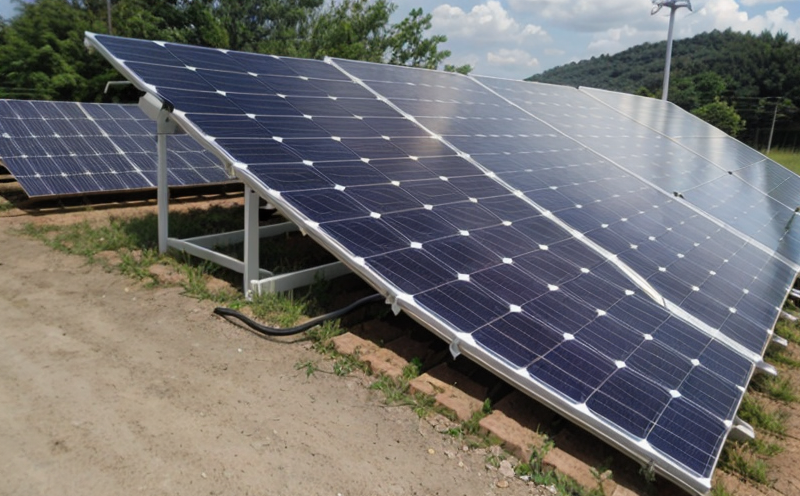IEC 61730-2 Wet Insulation Resistance Testing
The IEC 61730-2 standard is a critical part of photovoltaic module safety testing. This section delves into the intricacies of wet insulation resistance testing, focusing on how it ensures the reliability and safety of solar panels in real-world conditions.
Wet insulation resistance testing evaluates the insulating properties of PV modules when exposed to moisture—a common environmental condition that can lead to degradation or failure if not properly addressed. This test is particularly important for ensuring that the electrical insulation within a module remains robust, preventing short circuits and potential fires. The standard specifies conditions where water is applied to simulate rain exposure, followed by measuring the resistance across the module.
The testing process typically involves conditioning the sample in controlled environmental chambers to simulate real-world humidity levels. This ensures accurate measurement of insulation resistance under conditions that mimic actual use scenarios. The test setup includes a specific voltage application and measurement time, which are critical for obtaining reliable results.
Accurate and consistent measurements are paramount in ensuring compliance with IEC 61730-2 standards. Instruments used must be calibrated to meet the precision required by this standard. Specimen preparation is also crucial; it involves cleaning the module surface thoroughly before testing, as dirt or debris can interfere with accurate resistance readings.
The results of wet insulation resistance tests are reported in ohms (Ω). Compliance with IEC 61730-2 requires that the measured resistance values meet specified criteria. Failure to achieve these standards could indicate potential safety hazards and reliability issues, necessitating further investigation or corrective actions.
Understanding the importance of this test helps quality managers and compliance officers make informed decisions about product design and manufacturing processes. It is a cornerstone in ensuring that solar panels can withstand environmental challenges while maintaining high levels of performance and safety.
Why It Matters
The IEC 61730-2 wet insulation resistance test holds significant importance for the energy sector, particularly within renewable energy and photovoltaic module manufacturing. By ensuring that modules can withstand exposure to moisture without compromising their electrical integrity, this testing process enhances overall system reliability and safety.
Customer satisfaction is directly linked to the performance of solar panels in real-world conditions. Ensuring compliance with IEC 61730-2 standards through rigorous wet insulation resistance tests demonstrates a commitment to quality and customer trust. This not only improves brand reputation but also fosters long-term relationships by delivering products that meet or exceed expectations.
From an environmental perspective, reliable solar panels contribute positively to sustainability goals. By reducing the likelihood of failures caused by moisture-related issues, these modules can operate more efficiently over their lifespans, thereby optimizing energy production and minimizing waste.
Customer Impact and Satisfaction
Customers in the renewable energy sector benefit greatly from the stringent testing processes mandated by IEC 61730-2. These tests ensure that solar panels are not only safe but also capable of performing optimally under various environmental conditions.
The high-quality standards set forth by this standard contribute to increased customer satisfaction through enhanced reliability and performance. This, in turn, leads to greater trust in the products offered by manufacturers who adhere strictly to these guidelines.
By implementing wet insulation resistance tests as part of their quality control procedures, companies can differentiate themselves from competitors by offering superior product performance and safety features. Such commitment is likely to attract more customers looking for reliable solutions that meet or exceed industry benchmarks.
Environmental and Sustainability Contributions
The IEC 61730-2 wet insulation resistance testing plays a crucial role in promoting environmental sustainability within the renewable energy sector. By ensuring that solar panels can withstand moisture exposure without compromising their electrical integrity, this standard helps enhance overall system reliability and safety.
From an environmental standpoint, reliable solar panels contribute positively to sustainability goals. They operate more efficiently over their lifespans, optimizing energy production while minimizing waste. This contributes significantly towards reducing carbon footprints associated with electricity generation from fossil fuels.
The stringent testing procedures outlined in IEC 61730-2 help manufacturers identify potential weaknesses early on during development stages, allowing them to address these issues before products reach the market. This proactive approach ensures that only high-quality, sustainable solutions are available for end-users, further enhancing environmental benefits.





